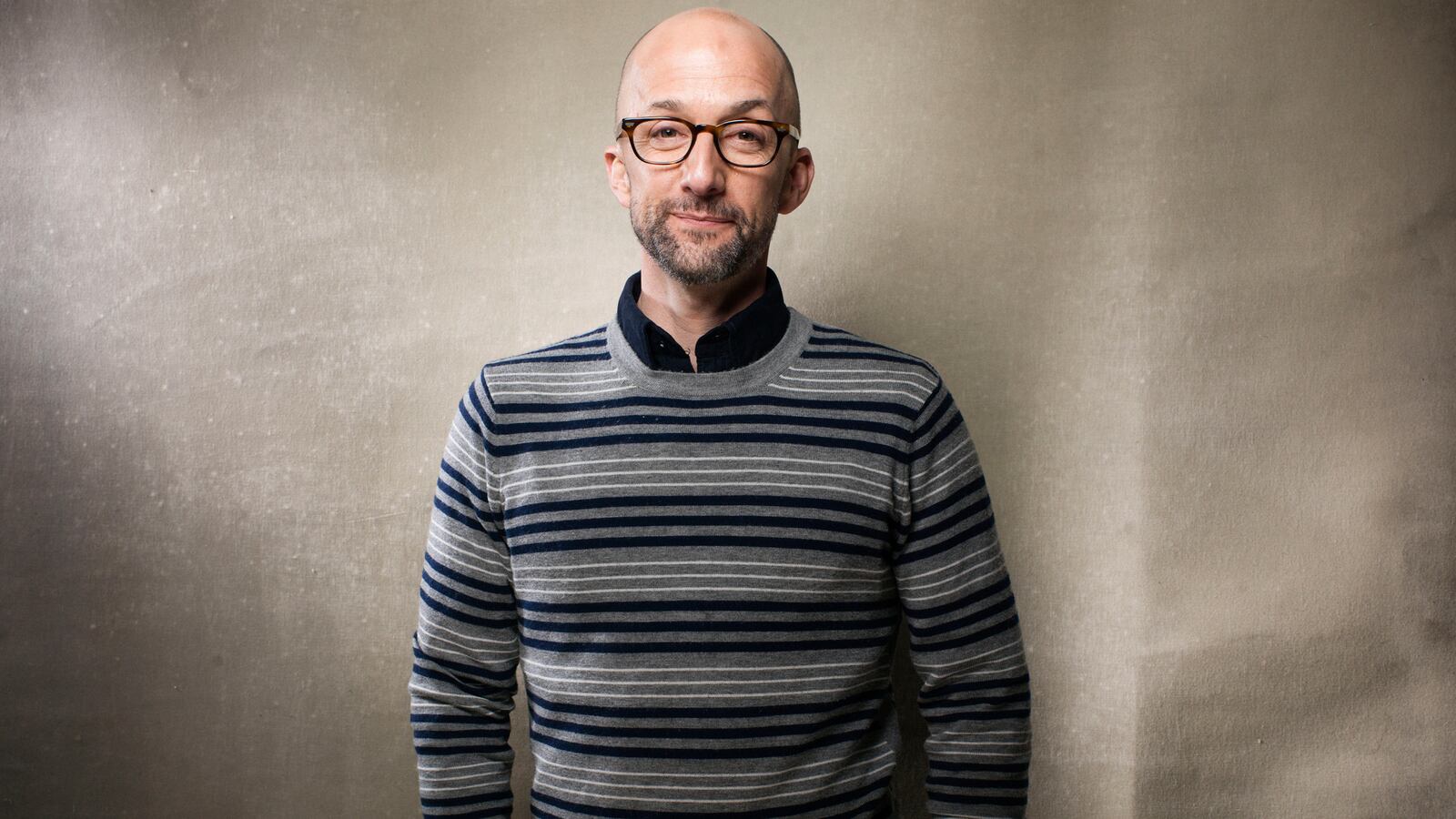You couldn’t write a bit that good.
Just hours after the up-to-there slit on her red-carpet gown made “Angelina Jolie’s leg” an Internet meme at the 2012 Oscars, Jim Rash (along with co-writers Alexander Payne and Nat Faxon) win Best Adapted Screenplay for their work on The Descendants, rush to the stage to accept their trophies, and Rash juts out his hip and sticks out his leg, the perfect mimic of Jolie and the perfect Oscar moment.

The moment catapulted actor-writer Rash to viral fame, raising awareness not only of his quick wit and comedic genius but also, to fans of Community who knew him only as ebullient and effeminate Dean Pelton, of his prodigious writing talents. It’s that special combination that makes him such a winning host on Sundance’s interview series The Writers’ Room, which begins its second season Friday night with an episode featuring the creative team of ABC’s Scandal.
For fans of good TV—the ones who relish a good binge-watching session and tweet obsessively at the writers and stars of their favorite series about every single plot point—it should be required viewing. Rash spends the half-hour dishing with the geniuses behind today’s richest and most popular television series—many of them, like Scandal’s Shonda Rhimes, celebrities in their own right with massive fan followings—about what it’s like behind scenes when some of TV’s most buzzworthy moments are being created.
Friday’s Writers’ Room episode, for example, finds Rhimes, star Kerry Washington, and members of the writing team breaking down that wrist-chewing scene and the surprising plot points that almost were. (Could you imagine if Jake Ballard was vice president? It almost happened!)
The Writers’ Room’s first season saw Rash speaking with brains behind Breaking Bad, Game of Thrones, and more, and season two will feature chats with the writers of The Walking Dead, The Good Wife, and even Pretty Little Liars. Ahead of the premiere, we chatted with the Community star and Oscar-winning screenwriter about what he’s learned from talking to so many great TV writers, the most surprising revelations he’s eked out of them, and the future of his little NBC sitcom that could.
Do you actually watch all of these shows?
I do! It’s a lot of weekends…Luckily, some of these shows I was already watching. I was already watching Breaking Bad and Game of Thrones last year, and I was already watching Parks and Recreation. But then I just do some binge watching. Now, clearly, with Pretty Little Liars, there’s like 100 episodes. There’s no way I was going to be able to fit in 100 episodes of Pretty Little Liars, so I just sort of watched a list of key episodes.
What!? You weren’t already watching Pretty Little Liars?
[Laughs] No, I’m sorry, I had not been sucked into that show. I’ve been sucked into a lot of things, but not that one yet. But there some shows that I just caught up on everything. Sons of Anarchy, there’s a lot of seasons, but I started from the beginning and then I got sucked in.
What about Scandal? Had you watched much of it before?
No. That again sort of flew by. So I was able to catch up. I knew ahead of time that they were entertaining, so it’s not like I crammed it all. I was able to pepper them over time.
What makes Scandal, or any show, a good subject for The Writers’ Room?
It’s hard to say. I feel like what’s nice is that there’s tonally a different thing with each show, from House of Cards to Scandal to Pretty Little Liars. I think what makes a good show is obviously a rabid fanbase. It doesn’t hurt when there’s a strong tie-in with social media. These showrunners are celebrities in their own right. People know Kurt Sutter and Vince Gilligan and Beau Willimon from House of Cards. But I feel like it would be interesting to talk with pretty much any show, because I feel like their journeys are always going to be different. The rooms are going to operate differently. So I don’t know if there’s a way to pinpoint, “This is the perfect show to chat with.”
There really has been a shift, like you said, that writers are becoming famous in their own right. Why do you think that is?
I think a lot of it has to do with, from my own world of Dan Harmon and Community, is that they are so vocal. And Shonda Rhimes is heavy into tweeting, and that kind of exposure allows fans to make contact with them. I assume that’s the biggest thing. It doesn’t hurt that these television shows—we’re in such a great period for television and storytelling. They’re not just character-driven dramas, but a lot of them have substantial arcs, like House of Cards, that have fans chatting online and they have a connection with each other. And they’re bringing up all types of stuff. I feel like it’s a little bit of everything. It’s the quality of the TV they’re putting out and the exposure to the fans.
You’re a writer, an Oscar-winning screenwriter. Have you learned any lessons about writing from hosting this show?
The great thing I think that’s consistent—whether it’s the guys from Game of Thrones last year or even talking to Beau Willimon, anyone—is the idea that it never is easy. In my mind, these people are brilliant and effortlessly write their shows. It’s nice to remind ourselves of the difficulties of not just writing, but the creative vision and getting it across. Any of that stuff is almost helpful, if only to your psyche. I should ask more about how to overcome writer’s block, too. [Laughs] Get real specific with them.
Is there anything that anyone’s said about their writing process that you found particularly surprising.
I wasn’t surprised because I had already heard it, but it was so interesting to me that the House of Cards staff is primarily playwrights. I found that fascinating, them coming into a whole new world. It was always fun to hear the processes. A lot of them have—this is not what they call it—bad pitches. They all have a corkboard or a dry erase board that was reserved for bad ideas. And sometimes an idea was pulled off there and became brilliant. I think the understanding for writers is that you pitch all these things and the response is, “that’s crazy, that’s terrible.” We talk about Scandal and the wrist-chewing scene. Someone throws it out there and it’s like, “That’s crazy!” But then you’re like, “…but wait, what happens if we do it?”
What did you think about that wrist-chewing scene? A lot of time is spent during the premiere on Scandal’s writers defending it.
Well, if I was speaking candidly, when I watch it the sound drives me crazy. It just keeps going! That’s part of what’s actually wonderful about it, though. It’s not a negative thing. It’s just like, boy, this chewing sound is really—maybe it’s perfect. I don’t know.
And you show the whole, gruesome scene all over again in The Writers’ Room episode. The whole thing.
I know! Believe me, I know. I think we’re just excited because it’s hard to get clips. So I think we got that one, and you gotta use it! But it’s nice, too, because you get to see their reactions to it. And then see them “defend it.”
The segment I love is hearing from the show’s writers what plot directions they had considered and ultimately nixed, like with Scandal, that Olivia wasn’t going to be a part of the election rigging and Jake Ballard was going to be Fitz’s running mate. Are there other tidbits like that from other episodes that you, as a TV fan, were most surprised by?
In House of Cards we talk about how the show begins, because it didn’t begin with the dog thing originally, with him approaching the dog and ultimately killing it. So we talk about the decision there and why he went with it, when originally it was what happens after that, him going to the party as he’s talking to us. Those things are my favorite, hearing the decisions from writers—where they started and where they ended up.
If you could bring back the writers’ room from a past TV show, which ones would you want to talk to?
I’d want to hit tentpole ones that stick out in my mind that speak to the time they were in. Anything Norman Lear, talking about All in the Family and stuff like that, to the growth of women and Mary Tyler Moore and that kind of world. It would be fun to talk to the Carl Reiners of the world, going back to Dick Van Dyke. I’d want to do Lost, just because I’m such a huge fan. It would be such a fun conversation to have, too, about how to bring a show to a close. With Sons of Anarchy we talked a little about it. And there’s such talk right now of the difficulties of it, coming off How I Met Your Mother and things like that, and who does it successfully. Lost obviously fits into that. I’d love to talk with MASH. There’s almost too many.
Would you ever want to do an episode of The Writers’ Room with Community?
Oh my God. You don’t know how hard I pushed for that this season, to have that happen.
Why hasn’t it!?
Because they already booked these shows. But I kept pushing them. “C’mon! We’re still in production! It would air in perfect timing!” And it wasn’t like they were fighting it. The producers are obviously huge fans of the show as well. But Season 3 I will make it happen! Especially if we were doing six seasons and a movie, it would be the perfect time.
So where does everything stand with Community and its future?
I don’t know! I think we’ll know in May when all the pilots get in and they take stock.
How are you weathering that roller coaster, with each and every year the future so up in the air?
I don’t know. You just get used to it. I think only from the first season to the second season was there a known pickup. The cast celebrated in the middle of the first season because there was a pickup already. That’s how it early it was! And then it becomes this sort of wait. It’s not like we’re the only show in this position. But, you know, we’re the little show that could. And it really is a testament to the model of a show that has such a social media following. It’s so hard to judge based on just Nielsen ratings or even DVRs at this point. It’s a whole different system that needs to be created to understand what a hit is. Too many shows meet their demise way early because of an archaic way of counting.






